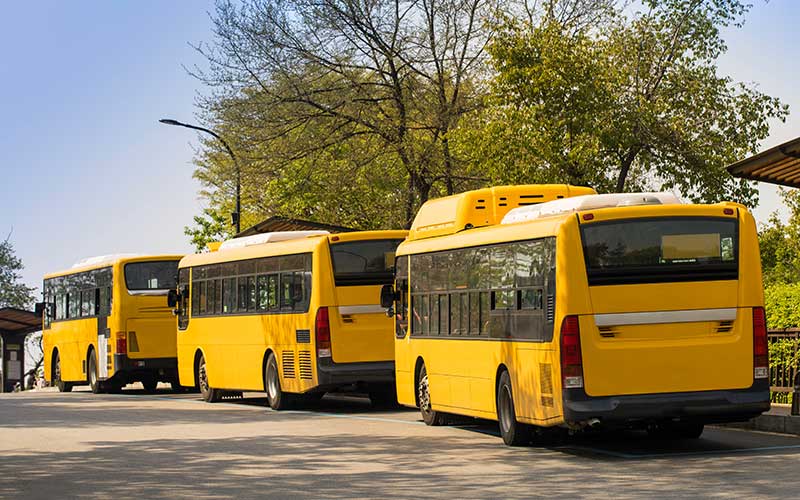
Requiring manufacturers to sell electric, zero emission medium- and heavy- duty vehicles (like these electric school buses) is part of California's clean trucks rules. Photo: Shutterstock, Jung U.
It’s no secret that New England loves its trucks – the bigger, the better. These rugged automobiles, and their other medium-and heavy-duty counterparts, take New England’s many unpaved roads like champs. And the entire country depends on trucks, buses, and large tractor trailers to transport a variety of goods: from food to furniture and everything in between.
Unfortunately, transportation is the largest source of climate-warming emissions in New England and the entire country. Not to mention, vehicles spew pollution that warms our climate and dirties the air. And these very same beloved medium- and heavy-duty vehicles are incredibly gas guzzling and polluting.
Right now, the EPA is considering denying a waiver that lets California implement a set of clean trucks rules which other states, like New England’s, can adopt. These rules are a series of regulations for medium- and heavy- duty vehicles stricter than the federal government’s. Let’s look at why these rules are so important and how big trucks (alongside buses and vans) can help us reach net zero climate-damaging emissions by 2050.
Dirty Fuels and Deadly Diesel
Medium- and heavy-duty vehicles, including buses, tractor-trailers, and vans, are those that weigh over 10,000 pounds. We use them to transport multiple commuters, passengers or large quantities of packages, goods, and other cargo. Unfortunately, such vehicles often rely on the dirtiest of fuels: among them is deadly diesel.
Diesel has a long and sordid history of polluting our air and climate. This fuel is linked to asthma and other respiratory illnesses. It also aggravates preexisting conditions like heart and lung disease. Worse, the public health impacts of diesel disproportionately affect communities already overburdened by environmental hazards, such as communities of color or low socioeconomic status.
Diesel trucks account for 50% of nitrogen dioxide emissions, an air pollutant that warms our climate and degrades air quality. This dirty diesel byproduct is also linked to premature death and respiratory or cardiac diseases. According to the University of Virginia, low-income communities and communities of color get exposed to 28% more of this pollution compared to majority white and high-income communities. That’s because racist and classist policies sited major highways and industrial compounds close to these communities, overburdening them with the accompanying environmental harms.
Big Solutions for Big Vehicles
Our economies and way of life hinge on the use of medium- and heavy-duty vehicles, so these forms of transportation must be part of our climate solutions. And these solutions must repair the inequities that force frontline communities to bear the brunt of environmental hazards.
One way is to regulate the amount of polluting emissions spewing from vans, buses, and trucks. Our state governments can also set goals for requiring manufacturers to produce and sell more electrified, zero-emission medium- and heavy-duty vehicles.
In fact, almost every New England state has adopted or plans to adopt California’s clean trucks rules which accomplishes these two strategies. The federal Clean Air Act allows California to create and implement stricter vehicle emission standards than the federal government, and other states can choose to adopt the California standards. Doing so here in New England will bring us one step closer to our goal of net zero climate-damaging emissions by 2050.
But the EPA might deny the waiver it’s historically approved, the waiver which allows California (and therefore other states, like New England’s) to set these stricter regulations. We need your help to tell the EPA to approve the waiver, for the sake of our health and our climate.
From public transportation to cargo and package deliveries, medium- and heavy-duty vehicles can continue to serve our needs while supporting the critical transition to a clean energy future.



